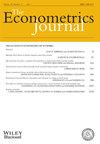面板数据非线性差中差的简单方法
IF 7
4区 经济学
Q1 ECONOMICS
引用次数: 0
摘要
对于响应变量的性质可能需要非线性模型的差异设置,我推导出简单、灵活的策略。我允许一般的交错干预,有或没有协变量。在平行趋势的索引版本下,我展示了对被治疗者(ATTs)的平均治疗效果是为每个队列和队列接受干预的日历时间段确定的。线性指数族的池拟极大似然估计扩展了线性模型的池一般最小二乘估计。通过使用与规范链接函数相关联的条件均值,整个样本的imputation和pooling产生相同的估计。一般来说,池估计的结果是非常简单的计算ATTs及其标准误差。主要的情况是二元和分数结果的logit函数形式-与伯努利准对数似然(QLL)相结合-以及指数平均值与泊松QLL相结合。本文章由计算机程序翻译,如有差异,请以英文原文为准。
Simple approaches to nonlinear difference-in-differences with panel data
Summary I derive simple, flexible strategies for difference-in-differences settings where the nature of the response variable may warrant a nonlinear model. I allow for general staggered interventions, with and without covariates. Under an index version of parallel trends, I show that average treatment effects on the treated (ATTs) are identified for each cohort and calendar time period in which a cohort was subjected to the intervention. The pooled quasi-maximum likelihood estimators in the linear exponential family extend pooled ordinary least squares estimation of linear models. By using the conditional mean associated with the canonical link function, imputation and pooling across the entire sample produce identical estimates. Generally, pooled estimation results in very simple computation of the ATTs and their standard errors. The leading cases are a logit functional form for binary and fractional outcomes—combined with the Bernoulli quasi-log likelihood (QLL)—and an exponential mean combined with the Poisson QLL.
求助全文
通过发布文献求助,成功后即可免费获取论文全文。
去求助
来源期刊

Econometrics Journal
管理科学-数学跨学科应用
CiteScore
4.20
自引率
5.30%
发文量
25
审稿时长
>12 weeks
期刊介绍:
The Econometrics Journal was established in 1998 by the Royal Economic Society with the aim of creating a top international field journal for the publication of econometric research with a standard of intellectual rigour and academic standing similar to those of the pre-existing top field journals in econometrics. The Econometrics Journal is committed to publishing first-class papers in macro-, micro- and financial econometrics. It is a general journal for econometric research open to all areas of econometrics, whether applied, computational, methodological or theoretical contributions.
 求助内容:
求助内容: 应助结果提醒方式:
应助结果提醒方式:


